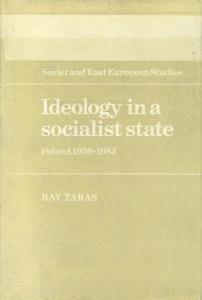
İkinci El
Ideology in a Socialist State describes the changes in the ideology of Poland's rulers from the October events of 1956 to the lifting of martial law in 1983. Ideology has been one of the most debated and equivocal concepts in social science, yet this is one of the first attempts to examine it in a systematic, longitudinal and empirical way. Dr Taras analyses how central principles of Marxism-Leninism (the leading role of the party, party influence on trade unions, the church, culture and science) were interpreted by Poland's political leaders. Ideological change, he suggests, represents the chief means adopted by, the regime to respond to a postwar cycle of crises. The rulers' ideology is also linked to political developments in other socialist states (the 1968 Czech reform movement, Soviet doctrinal shifts). Taras concludes that as a result of both external and internal factors, ideology in Poland underwent a combination of transformations, innovations and reification that has produced a new hybrid and highly unstable ideology - Leninist Marxism of People's Poland. This puts the tumultuous Polish events of 1981-3 into historical perspective and focuses on the response of the party leadership to the challenge of Solidarity, and of martial law.
İkinci El
Ideology in a Socialist State describes the changes in the ideology of Poland's rulers from the October events of 1956 to the lifting of martial law in 1983. Ideology has been one of the most debated and equivocal concepts in social science, yet this is one of the first attempts to examine it in a systematic, longitudinal and empirical way. Dr Taras analyses how central principles of Marxism-Leninism (the leading role of the party, party influence on trade unions, the church, culture and science) were interpreted by Poland's political leaders. Ideological change, he suggests, represents the chief means adopted by, the regime to respond to a postwar cycle of crises. The rulers' ideology is also linked to political developments in other socialist states (the 1968 Czech reform movement, Soviet doctrinal shifts). Taras concludes that as a result of both external and internal factors, ideology in Poland underwent a combination of transformations, innovations and reification that has produced a new hybrid and highly unstable ideology - Leninist Marxism of People's Poland. This puts the tumultuous Polish events of 1981-3 into historical perspective and focuses on the response of the party leadership to the challenge of Solidarity, and of martial law.

